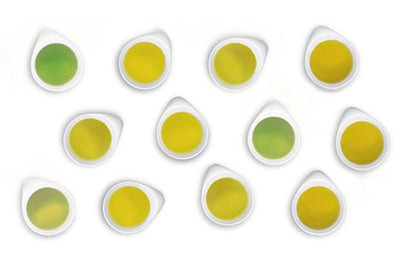Vinegar has been used medicinally for thousands of years.
In the present day, research has shown that vinegar could have many health benefits such as managing blood sugar levels and possibly suppressing body fat.2 It has also been suggested that vinegar can stimulate more effective fat burning.
Before you add it to your weight loss program, here's what the evidence has to say on whether vinegar can reduce body fat and improve your health.
Vinegar and Acetic Acid
Vinegar contains acetic acid which is made by fermenting carbohydrates (the source of which could be anything from grains to apples). Acetic acid is what gives vinegar its sour flavor. It's also the active ingredient that links vinegar to numerous health benefits.
Vinegar that is used for consumption is approximately 3% to 9% acetic acid by volume (essentially diluted acetic acid).3
Acetic acid is a short-chain fatty acid that occurs naturally in body fluids and is produced by the good bacteria in your gut.4 When you eat fiber-rich foods, the fiber in your colon and produces acetic acid.
It's been proposed that increasing short-chain fatty acids like acetic acid could play an important role in body fat reduction. It could also assist with other key bodily functions, including:5
- Improving colon health
- Increasing metabolism
- Naturally suppressing appetite
- Promoting more efficient carbohydrate and fat metabolism
The main research that linked vinegar to body fat was an animal study in 2017 that was published in the Science Report. The findings suggested that vinegar could suppress fat accumulation in mice.6
While the study was done in rodents, the researchers concluded that vinegar would have a similar effect on body fat in humans. However, more research is needed to test the theory.
Vinegar Could Help Burn and Suppress Body Fat
In 2009, a study conducted in Japan on 155 obese subjects over a 12-week treatment period examined the effect of vinegar on body fat.7 The study participants were separated into three groups based on similar weight, BMI (Body Mass Index), and waist measurement.
Body Mass Index (BMI) is a dated, biased measure that doesn’t account for several factors, such as body composition, ethnicity, race, gender, and age.
Despite being a flawed measure, BMI is widely used today in the medical community because it is an inexpensive and quick method for analyzing potential health status and outcomes.
Apple cider vinegar (ACV) was selected because it is a more palatable form of vinegar. During the test trial, the volunteers drank a 500ml beverage containing 15 mL of vinegar, 30 mL, or 0 mL. The participants' food intake and exercise were strictly monitored and accurately recorded during the study.
Is Switchel a Healthy Energy Drink?
The participants who drank both low and high doses of vinegar showed positive results. By week four, the participants demonstrated decreased weight, body fat percentage, and BMI compared to the placebo group. Waist circumference, waist-hip ration, and serum triglycerides also fell starting in week eight.
The participants who were consuming the highest dose of vinegar showed the greatest improvement. The findings seemed to indicated that higher acetic acid values were favorable to burning fat more effectively and suppressing fat stores.
When you consume vinegar, it could be acting as a mediator to control chemical processes that would otherwise create fat.
Acetic acid might help the body suppress body fat through a process called inhibition of lipogenesis (fat storage), which means that the acetic acid in vinegar blocks certain enzymes from creating fatty acids in the body.
The study also indicated that vinegar stimulates fatty acid oxidation (burning), which occurs as a response to improved gut bacteria influencing how your body burns and stores fat.
According to research, acetic acid regulates fat metabolism by increasing the rate your body burns fat while also decreasing fat storage.
The study's conclusions lean toward vinegar being a fat suppressor and burner. Compared to expensive, ineffective fat-burning supplements, it's appealing to think that the safest remedy is probably in your pantry.
Vinegar Might Help Reduce Visceral Fat

Researchers in the above study also noted numerous other health benefits of vinegar in the course of there study. For example, the participants drinking both low and high vinegar doses had significant decreases in visceral fat.7
Vinegar could be beneficial for reduced weight, decreased visceral and subcutaneous fat, and lowered triglyceride levels.
Visceral fat is located in the abdominal cavity and surrounds vital organs like the pancreas, liver, and intestines. It’s also referred to as "active fat" and plays a role in your metabolic processes and hormone function.
Research has shown that reduced visceral fat has a positive effect on metabolic risk factors such as hypertension and impaired glucose tolerance.8 Reduced triglyceride levels (fat in the bloodstream) has also been shown to lower the risk of heart disease.
Vinegar Could Improve Glucose Response
A small study published in the Journal of Diabetes Research in 2015 examined how vinegar would affect blood glucose (sugar) levels during a mixed meal in adults with type 2 diabetes.2
The patients were given either 30 ml of vinegar mixed with water or a placebo at random order on two separate days a week apart. Five minutes after the drink, subjects consumed a meal consisting of cheese, turkey ham, orange juice, butter, and a cereal bar within fifteen minutes.
The vinegar reduced postprandial hyperglycemia, hypertriglyceridemia, and hyperinsulinemia in this study.
The results suggest that having a mixed meal containing acetic acid in the form of vinegar reduces the glycemic response in the bloodstream. Vinegar is not only great for a tasty salad but could help you maintain healthy blood sugar levels.
The Annals of Nutrition and Metabolism had published a similar study in 2010.9 The study examined the effect of vinegar ingestion both during mealtime as well as five hours before. The researchers were specifically looking for differences in glycemic (sugar) response based on when the vinegar was consumed.
The findings from four randomized studies indicated that taking two teaspoons of vinegar with a complex carbohydrate meal reduced glycemic response better than consuming vinegar five hours before eating. One trial was dedicated to participants with type 2 diabetes and the remaining three trials included healthy adults. All participants following a strict meal and fasting protocols during each testing cycle.
Nutrient timing has become an important variable in scientific discussion and research.
Other results from across the studies showed that consuming vinegar with simple sugars like fruit did not change the participant's glycemic response. Overall, the glycemic response improved by 20% for the participants who consumed vinegar with a complex carbohydrate meal.
In 2007, the American Diabetes Association (ADA) published a study that sought to determine whether a dose of vinegar taken at bedtime would reduce fasting glucose in people with type 2 diabetes.10
The study participants were non-insulin-dependent and included four men and seven women aged 40 to 72. The participants were instructed to follow a strict preparation protocol. Their fasting glucose was measured for three consecutive days prior to testing. All participants ate identical meals with specific quantities of carbohydrates, proteins, and fats.
During the two-day trial, the participants were given either two tablespoons of vinegar or water along with one ounce of cheese at bedtime. The participants who took vinegar before bed had a 4% reduction in fasting glucose compared to a 2% reduction among those who received only water. The researchers concluded that the acetic acid in the vinegar helped decrease the sugar load from consuming starchy foods.
The ADA concluded that a dose of vinegar at bedtime could have a positive effect on waking glucose levels in people with type 2 diabetes. However, additional research is needed to strengthen the evidence in support of the connection.
Is All Vinegar the Same?

Vinegar means "sour wine." Depending on the acetic acid content (3% to 9% by volume), different types of vinegar will have a stronger taste. If you want to add vinegar to your diet, you might want to try different types to find the one that is most palatable to you.
Vinegar doses can range from a teaspoon to a tablespoon taken with a full glass of water up to three times per day. Vinegar can also be enjoyed (and is most often consumed) mixed with olive oil and drizzled on salad greens.
While it could be part of a healthy diet, you should also be aware that there are some possible side effects of drinking diluted vinegar,11 including:
- Damage to the esophagus (from drinking straight vinegar)
- Interfere with certain medication (for example, insulin, blood thinners, or diuretics)
- Low potassium levels
- Nausea and vomiting
- Stomach upset
- Throat irritation
- Tooth enamel erosion (in higher doses)






